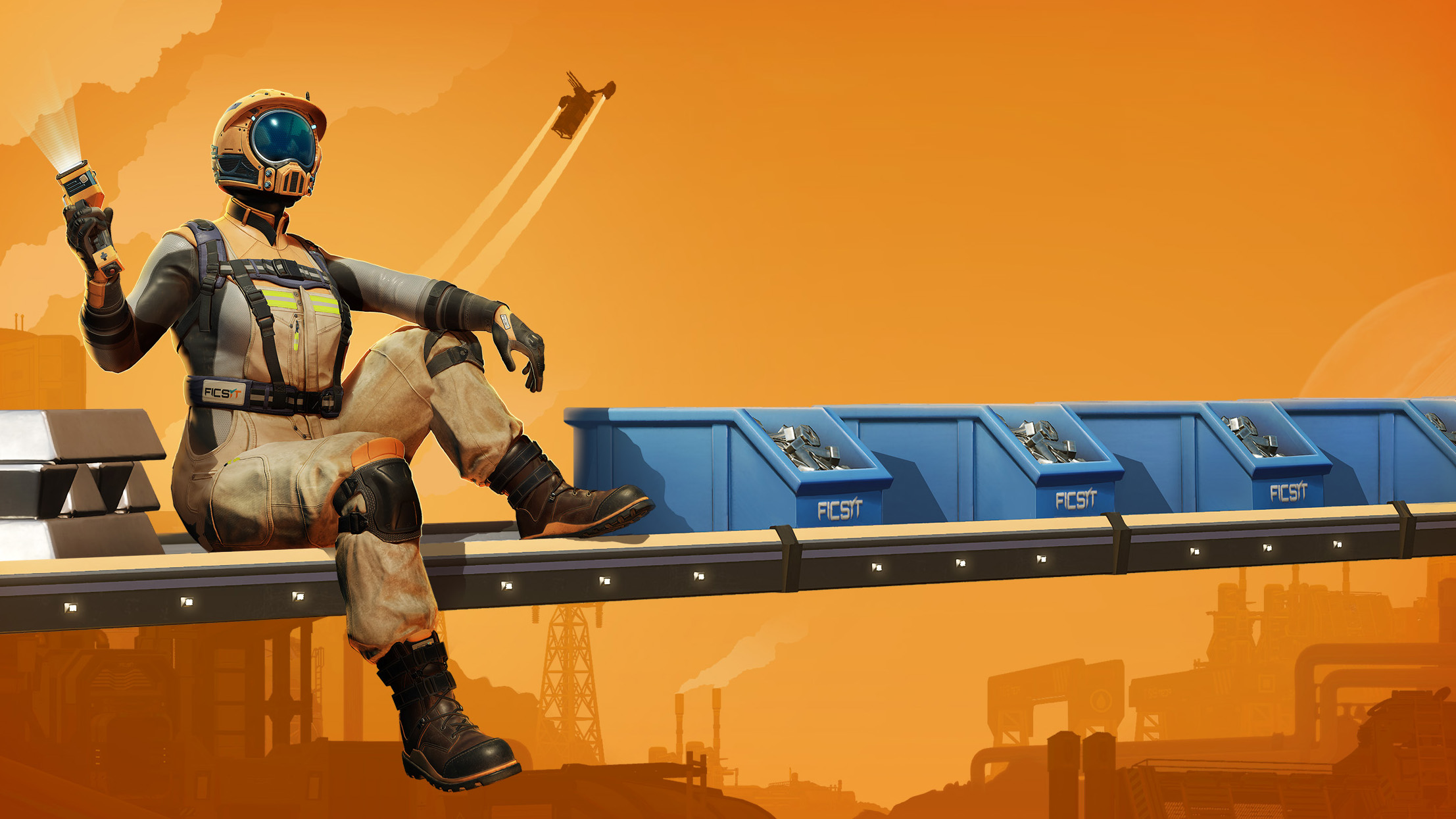
Satisfactory's launch version finally includes a "story" alongside loads of new features. Let's take stock.
In a vicious, targeted attack on my free time, automation game Satisfactory is entering full release today, a full five-and-a-half years after it launched in early access in 2019. In that time it’s added multiple tiers of increasingly complex production line objectives and the parts and tools needed to build them. It’s added trucks, trains, nuclear power, particle accelerators, dedicated servers, blueprints so you can copy and paste entire elaborate builds, and perhaps most importantly of all, zooping. You haven’t lived unless you’ve zooped, man.
The short version is there’s way more to do in Satisfactory than there was in the beginning, there are way more ways to do those things, and there also way more tools to dial up the efficiency of how you’re putting together your factories. You’ll still start a new game by slowly hand-assembling iron plates and rods, but before long you’ll unlock blueprints that let you cut down on the repetition of laying down row upon row of manufacturing, to focus more on the fun big picture stuff. Or you can ignore those blueprints and lay down every piece one at a time. I’m not here to police your fun.
What I am here to do is lay out how Satisfactory has changed in 1.0, specifically since its most recent update. Most of the things I mentioned in the first paragraph have been in the game for years, at this point. So what’s, like, new new in today’s full release? Here’s a quick overview of the important stuff.
Performance improvements and optimizations
Satisfactory is a heavy game, at least in certain instances—when you’re standing in the middle of a giant factory with thousands of buildings and items all around you, or apparently when you’re driving in vehicles, which required some major hit detection processing around foliage and other obstacles. 1.0 includes some significant optimizations that should be a blessing on low-end and high-end hardware, and even dedicated servers, as highlighted in this video:
DLSS are both updated to their latest versionsSatisfactory is now on Unreal 5.3, which offers some performance improvements by itselfSaving and loading are now much faster due to the way the game’s data has been reorganizedImprovements to texture sizes and many small adjustments have added up to lower VRAM requirementsVehicles no longer destroy small foliage, which helps lower traversal stuttering and on dedicated servers can lower RAM usage from 12+ gigabytes on a save file to a more modest 5-6 gigs.Conveyor belts are “significantly” optimized, pooling together entire runs of conveyor belts as opposed to them being divided into sections
Some small (but significant) quality of life features
Getting buildings perfectly aligned in Satisfactory has always been pretty good, but with enough little issues here and there to really slow you down or set off the OCD. Coffee Stain has focused on making things snap together just a bit better across the board. Here are some specific improvements detailed in this video:
Conveyor belts have a new “straight” build mode which gives them perfect 90 degree corners, and they look fabulousYou no longer have to aim right at the input/output spot on a building to attach a conveyor to it; as long as you’re aimed at the building, your construction should snap to the logical input or output. When you hold Control on your keyboard buildings will now snap to foundations or to other buildings, with visual lines indicating what they’re aligning to. These are color-coded to show input/output or center of mass of what’s being aligned to.
There’s finally a use for Somersloops and Mercer Spheres
These two mysterious, magical artifacts tie into the light narrative of Satisfactory. You’ll find them scattered across the world as you go exploring, and finding them now triggers some brief voiceovers to tease at a larger mystery. I haven’t played enough of 1.0 to know how much “story” there really is in collecting tons of them. But more important is that they now can be used to research new tech trees in the MAM (aka the Molecular Analysis Machine). They unlock some pretty tantalizing new tech that I don’t really want to spoil!
The space elevator now expands as you progress
This is a really cool visual touch. Your overarching objective in Satisfactory is to build some particularly complex parts that you send off into a space elevator, which visually hangs in the sky above the planet. Now with each new wave of parts you send off, you can see the elevator platform faintly through the atmosphere getting bigger and bigger. There’s just generally more of a sense of “progression” in the 1.0 release that wasn’t there before. Not having it never really felt like a dealbreaker to me, because Satisfactory is really more about optimization and designing whatever overly ambitious monstrosity you can imagine than “finishing” or “going to bed on time.” But it’s still nice to have the reward for a job well done, and I imagine that’ll be particularly gratifying for folks who really only want to play through all the construction tiers once and feel like they’ve beaten a campaign.
Player customization is in
Satisfactory has always cast you as a nameless worker bee dressed in an orange jumpsuit and opaque-visored helmet, but no longer! Now you can be a nameless worker bee dressed in a different colored jumpsuit, and choose from several opaque-visored helmets! There are also more building cosmetic parts and paint options.
More resource nodes across the map
Satisfactory’s developers have added more resource nodes to the map, giving you more options for where to build—or where to mine resources and then send them back to a centrally located base with trucks, trains, drones, or extremely long conveyor belts. Here’s an image provided by Coffee Stain showing all the new node additions:
(Image credit: Coffee Stain Studios)
The number of new coal nodes and quartz nodes in particular stand out to me, but the quartz additions are actually mostly balanced out by a ton of quartz nodes the developers have removed. Here are the nodes that are gone, as of this update:
(Image credit: Coffee Stain Studios)
There are some new fuel types especially useful for jetpacks and drones
Satisfactory has long had a material called turbo fuel. That fuel type can now be converted into two new higher-end fuels, rocket fuel and ionized fuel. If you use these to power a jetpack, they give different advantages: the rocket fuel lets you go higher, while the ionized fuel lets you go faster while comparatively sipping gas.
Drones can now use fuel in addition to batteries, and they’ll also perform differently depending on the fuel type.
Tier 9’s Quantum Tech adds new challenges
Something tells me constructing time crystals is going to tie into Satisfactory’s new story, somehow. And you’re definitely going to need some massive power output to be able to handle this tier of construction.




